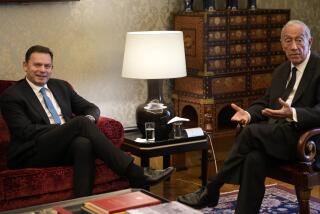Turkish Leader Calls for Study of Genocide Debate
Prime Minister Recep Tayyip Erdogan on Tuesday called for an impartial study by historians of claims that more than a million Armenians were slaughtered by Turkish troops in a genocide during and after World War I.
The statement was widely seen here as a symbolic if small step by Turkey to address the issue after decades of denial.
“We have opened our official archives to those people who claim there was genocide,” the Turkish leader said at a news conference here. “If they are sincere, they too should open their archives.”
Erdogan was referring to archives in Germany, Turkey’s wartime ally, and in Britain and France, whose forces occupied parts of Turkey after the collapse of the Ottoman Empire at the end of the war. Troops from all three nations could have witnessed what happened between the Turks and the Armenians.
“Teams of historians from both sides should conduct studies in these archives,” Erdogan said of the Turks and Armenians. “We do not want future generations to live under the shadow of continued hatred and resentment.”
Armenians say 1.5 million of their people perished between 1915 and 1923 in a genocide perpetrated by Ottoman Turks. Millions of Armenians worldwide are set to mark the 90th anniversary of the beginning of the violence on April 24.
Turkey has countered that several hundred thousand Armenians died of starvation and exposure during forced deportations after they collaborated with invading Russian forces in eastern Turkey.
But a small, vocal group of Turkish intellectuals has begun to challenge the official version of events, saying genocide did take place under the orders of ultranationalist military officers who led the country at the time. That view has touched off heated debate throughout Turkey.
Turkish author Orhan Pamuk, whose recent novel, “Snow,” has made bestseller lists in the United States, was labeled a traitor here and faced death threats after telling a German newspaper last month that “a million Armenians were killed in Turkey.”
Erdogan’s appeal for an unbiased investigation was issued jointly with Deniz Baykal, the leader of the opposition Republican People’s Party, and it reflects growing concern about the issue after calls came from within the European Union for Turkey to acknowledge that genocide occurred. Some EU members have gone so far as to suggest that such recognition should be a condition for Turkey’s entry into the European alliance.
The parliaments of Canada, France and Switzerland have approved resolutions stating the Armenians were victims of genocide. Similar measures proposed by members of the U.S. Congress have been quashed by successive Republican and Democratic administrations wary of alienating Turkey, an important North Atlantic Treaty Organization ally.
“It is encouraging that the government is finally willing to talk about the Armenian issue,” said Hrant Dink, publisher of the Armenian-language newspaper Agos.
“And if they are truly sincere, they must bear the consequences of what historians uncover -- face up to the horrors of the past.”
More to Read
Start your day right
Sign up for Essential California for news, features and recommendations from the L.A. Times and beyond in your inbox six days a week.
You may occasionally receive promotional content from the Los Angeles Times.






